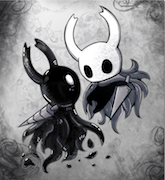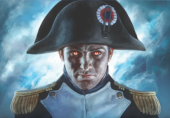|
I have to agree with UnclePlasticBeach that less is more in this case. Not everything needs to be taken to the Nth degree just to make the same point. This is still a mass market product after all. Finished this game not too long ago and found this thread only after that. Glad to see others had mixed feelings about the ending though. It felt like the game was leading somewhere, but the plot just fell apart at the end. I don't think Ken Levine saying that the game is 'open to interpretation' helps, since I still feel like Rapture was shoe-horned in and was more of a distraction than anything. Sundowner - Are you planning on playing the DLC? I already spoiled it for myself out of overwhelming curiosity, but others might want to see it in LP form.
|
|
|
|

|
| # ? May 5, 2024 05:41 |
|
It's kind of funny that the reviewer wanted more explicit racism, because I'm on the other side of it - I think Infinite's use of racism as a minor background element to be safely ignored after the first half of the game is kind of tacky. If you're not going to tackle the big issues in a tasteful way, or even make them relevant to the overarching story in any way, then maybe design a setting that doesn't throw them in your face. Although I think his issue with the baseball scene in general was that it was done via [GOOD THING - PRESS A], [EVIL THING - PRESS B] button prompt rather than allowing the player to actually decide of their own volition where to throw it (at the people or at the announcer or at the ground or up into the air, who knows)?
|
|
|
|
Speaking of choices, I'm not fond of the game not having any that actually have an effect other than 2 lines of dialogue, Elizabeth's necklace design, and whether Booker's hand is bandaged. It's disappointing to have a Bioshock that doesn't have alternate endings. The constants have been, are, and will be, but what about the variables. 
|
|
|
|
Some of you guys are making this more difficult than it really needs to be. Possibly deliberately. The entire plot of the game hinges on the decision Booker makes at the Baptism. From the two possible choices (Acceptance or Refusal), two main Alternate Earths are created, from which immediately branch an infinite number of Alternate Earths based on that decision. Nothing about the plot or choices in the game are inconsistent with this. As we jump back and forth between alternate Columbias (Red and Blue), we aren't necessarily jumping into the exact same version of the Red or Blue universe, just one of an infinite number that hew very closely to the Red or Blue timeline. When a bunch of Elizabeths drown Booker/Comstock at the end of the game, we're not just seeing him killed at that point in one timeline, but we are seeing an Infinite number of Elizabeths, in an Infinite number of Alternate Earths, drowning an Infinite number of Bookers who made the choice to become Comstock, at the exact same moment, effectively deleting that particular branch (and every other connected to and effected by it) at the same time. The reason we only see a handful of Alternate Elizabeths doing the deed is because it's a video game, and there is only so much you can do with the medium before time and hardware constraints force you to quit adding poo poo. I agree that the choices the game does give you should have been expanded somewhat, and an alternate ending would have been nice. (Though I'm not sure what it would be or where it would go. Maybe an Infinite number of Bookers convince an Infinite number of Elizabeths to not destroy an Infinite number of Siphons, preventing an Infinite number of Elizabeths from achieving Apotheosis, and then they go off to an Infinite number of Parises? Parees?) That being said, here are a number of things that we should technically be seeing during the Chaos that is Bioshock Infinite, and that if we ever get an Infinite Novelization should be included: - An Infinite number of Bookers and Comstocks dying or being killed at an Infinite number of points before and after the Battle of Wounded Knee. Technically we do see this with Booker during his time at Columbia (every time you got him killed). - An Infinite number of Robert/Rosalind Leuteces that also got thrown out of the time-stream, and are constantly interfering with the Robert/Rosalind that we interact with again and again as part of the story. OR DO WE? - An Infinite number of Robert/Rosalinds that never have anything to do with time travel and dimension jumping and therefore live out an Infinite number of incredibly boring lives that don't involve sharing an Infinite number of beds with an Infinite number of extra dimensional versions of themselves. The poor dears. - An Infinite number of Elizabeths that were born male (Elijahs?), that did not cause an infinite number of players to encounter Schrodinger's Menses. If only. - An Infinite number of Elizabeth/Elijahs that lost an Infinite number of other body parts to an Infinite number of closing portals. An Infinite number of Alternate Earths in which an Infinite number of Bookers push an Infinite number of Elizabeth/Elijahs around Columbia on an Infinite number of wheelchairs. - An Infinite number of Song-birds that are made into the likenesses of an Infinite number of other animals. An Infinite number of Song-weasels. - An Infinite number of other characters (male and female or otherwise) doing an Infinite number of things that they did not do during the course of the game. An Infinite number of Columbias where an Infinite number of alternate skin-shade Bookers throw baseballs at an Infinite number and type of couples. A Green and Purple Polka-dot Booker throws a baseball at a pasty-faced, overweight Goon wearing an anime t-shirt and holding a RealDoll. - An Infinite number of Bookers that were born female and, therefore, most likely never served at Wounded Knee, and thus never reached a point where they would be faced with the Baptism decision. Neither do we see an Infinite number of Female Bookers who, thanks to an Infinite number of Alternate Earths, did serve at an Infinite number of Wounded Knees (or possibly Knee-Analogues) and went on to become either an Infinite number of Female Bookers who gave birth to an Infinite number of Elizabeth/Elijahs (male or female or neuter or both, or possibly with a head-mate) or an Infinite number of Female Comstocks who stole/purchased said Infinite number of infants.
|
|
|
|
Or an Infinite number of surrogate Big Daddies riding an Infinite number of alternative transportation methods with an Infinitely-diverse arsenal of weapons. Infinite Uncle Sams with Infinite crane hook hands on Infinite sky-bicycles. For a game like Infinite, there sure are very few variables after all, aren't there?
|
|
|
|
Yeah, the idea of there being an infinite number of different Elizabeth and Bookers kinda falls flat with the idea that in these universes there is only EVER two results that ever come up from it, i.e. Booker if he refuses baptism always becomes a drunk who has a baby and then sells the baby and Booker if he accepts baptism always becomes a racist autocrat who makes a sky-city. Hell, if you think about it, if this is indeed the case, the person to blame is not Booker, but Lutece. Without their multiverse-traversing science, Booker woild never have been able to sell the girl to Comstock, becasue Comstock would have never been able to even go to such a place. It's... dumb, really. Really, really, really dumb. Thanks for the LP, but I'm glad I didn't buy it. I mean, hell, you could make the ending a lot more... weird or unnerving if you showed a Booker who doesn't spiral into depression after refusing the baptism and actually comes to terms with what he did, or a Comstock who uses the baptism to turn to do good things... Samovar fucked around with this message at 08:30 on Jul 23, 2014 |
|
|
|
Samovar posted:Yeah, the idea of there being an infinite number of different Elizabeth and Bookers kinda falls flat with the idea that in these universes there is only EVER two results that ever come up from it, i.e. Booker if he refuses baptism always becomes a drunk who has a baby and then sells the baby and Booker if he accepts baptism always becomes a racist autocrat who makes a sky-city. Hell, if you think about it, if this is indeed the case, the person to blame is not Booker, but Lutece. Without their multiverse-traversing science, Booker woild never have been able to sell the girl to Comstock, becasue Comstock would have never been able to even go to such a place. Those are the only two results we see because they are the only two results that matter for the purposes of the plot. Your argument is that the plot fails because we never see the Infinite number of Bookers and Comstocks that made life choices that didn't result in them going to Columbia. Think about that for a minute. Showing that off wouldn't have served any more purpose than the other crap I said we should technically have been able to see. The entire thing is absolutely the fault of an Infinite number of Rosalind Leuteces though. I will agree with you on that.
|
|
|
|
Hello friends, I would like to talk about the one thing that piques me the most. WHY did Booker become Comstock in the first place? I suspect it was the atrocities and war crimes he committed at the "Battle" of Wounded Knee.( Read all about it!) He was either among the soldiers on the ground amongst the Lakota or a member of the regiment above the camp who shelled those below. (The General guy in the History Museum suggests the latter to me, but it really doesn't matter.) It's that guilt, of killing hundreds of American servicemen and men, women and children (some fleeing or unarmed) that made Booker originally want to seek absolution. It probably also gave him some mad PTSD at the very least. Read all about it!) He was either among the soldiers on the ground amongst the Lakota or a member of the regiment above the camp who shelled those below. (The General guy in the History Museum suggests the latter to me, but it really doesn't matter.) It's that guilt, of killing hundreds of American servicemen and men, women and children (some fleeing or unarmed) that made Booker originally want to seek absolution. It probably also gave him some mad PTSD at the very least. So the timeline is: - Booker joins the military - Booker participates in the "Battle" of Wounded Knee. Booker has seen some poo poo and needs therapy. - Booker, is full of guilt over his actions and turns to religion (presumably a fundamentalist branch of Christianity) to alleviate his conscience. He takes the name Zachary Comstock* OR + Booker, full of guilt over his actions at Wounded Knee considers religion but chickens out. He instead goes on a self-destructive bender, turning to alcohol (look at the amount of bottles in that office) racking up loads of gambling debt and at some point knocking up a random woman and having a baby. This baby becomes wake up call for him and begins the process of him cleaning up and turning his life around. Unfortunately he still has those gambling debts... - Booker, now Comstock, rides up in the church hierarchy to become its leader, transforming it into zealous religious cult. At some point during this time period, meets Rosalind Lutece and he extolls to her his batshit crazy dreams of a world severed from the current world where his way of life can be preserved. (Again, Comstock wants to run away from and burn the world because the Battle of Wounded Knee hosed him up.) Rosalind just wants to do science and Comstock has the resources of a large number of religious adherents who will die for him so... - Rosalind uses science to help Comstock create Columbia. Rosalind discovers the Multi-verse and the means to create tears. Comstock, who has already built himself up as a Prophet with all his crazy and predictions uses the tears to view the future, he prematurely ages himself and turns himself sterile somehow, ruining his prediction of his having a kid and that kid fulfilling his legacy. He turns to Rosalind for help and Rosalind, who already discovered her male-self (Robert) or soon will, hooks him up with his Other Self's kid. + Booker's Universes' Lutece gets the word from Rosalind and offers Booker a deal. Comstock will pay all Booker's gambling debts in return for Booker's baby. Booker agrees in infinite timelines, and we can assume he turns him down in other infinite timelines but for the purposes of this game this Booker agrees.** - Baby is hand crazy Comstock starts doing his crazy things, since she has the ability to manipulate tears, etc, she's perfect! Eventually some of the people get pissed at him and eventually he betrays the Luteces and they get put outside of time. Rosalind and Robert disagree about where to go from here, but Robert goes to Booker and offers him a new deal! + For 20 years an infinite number of Bookers who took the deal have been beating themselves up until an infinite number of Roberts show up and offer these Bookers opportunities to get their infinite daughters back and have some quality time by simply going to infinite Columbias and getting her from infinite Comstocks. These infinite Bookers agree. - and + The events of the game take place putting you in the shoes of one of these infinite Bookers, it doesn't matter which one but some of these Bookers sided with the populist revolt and became martyrs and some were murdered or failed to reach Elizabeth at all and there are also infinite other scenarios that played out that we never see and that don't really matter to the narrative. Ultimately Booker realizes that that HE is Comstock and guides Elizabeth, under the assumption that Elizabeth is guiding him (you lead the way to the Lighthouse) to THAT point in time where he becomes Comstock (Comstock Prime) and all the infinite Elizabeths from all the Comstock Universes drown him, making it so the infinite Comstock Universes never came to be! The paradox Elizabeths wink out of existence. HOWEVER ~ The Booker(s) that chickened out still technically exist with infinite(maybe?) Annalizabeth(s) that he will no longer be asked to sell to clear his debt because there are no Comstocks to approach him. The scene that plays after the blackscreen is presumably that/one of those Booker(s). Who loving knows if/how he clears his gambling debts in this/these universe(s). THE END. *He also becomes Mick Foley. **Presumably, and in canon, there are an infinite number of Bookers that don't take the deal and tell the Roberts to gently caress off as seen in the tilde timestamp. Those Bookers have their own adventures that we're not privy to.*** ***There are probably also universes where rejected Comstocks KIDNAP those Annalizabeths to get what he wants but those universes don't matter because they cease to exist when Comstock Prime is murdered. Jenner fucked around with this message at 09:01 on Jul 23, 2014 |
|
|
|
What you guys thought this story was going to be over that easily? This is Bioshock ladies and gentlemen; nothing ends easily.
|
|
|
|
I love the ending. But it's a lot like Looper in that it's geared towards a certain kind of person. Person a) Just has the entire thing fly over their head because it's pretty confusing Person b) gets quantum but has their brain turned off enough that they don't think about the specifics too much. Person c) Gets quantum and then tries to make sense of the specifics and goes completely insane. I fall into b) the pure ambition of the ending and the relationship between Elizabeth, Booker and Comstock is what ultimately I find myself invested in. The multiple universe theory sortof works at its barebones but I don't care about that so much. The resolution of the plot isn't to me so much that they kill every Comstock, it's that Booker is ultimately willing to kill himself as penance for what he did to Elizabeth. He becomes what a father is ultimately meant to be, not a drunk, not a lunatic trying to brainwash her, but someone that is ultimately willing to go through anything to protect his daughter.
|
|
|
|
Seeing as it hasn't necessarily been brought up I'd also like to point one thing about about Constants and Variables. That means the other BioShock games wrap neatly into this theme if you spin it the right way. There's always a man, a girl and a city and/or lighthouse - those are constants. In BioShock there's Jack who goes in to a lighthouse, in to a city beyond the sea and saves a bunch of girls (or not!) but in another timeline that could well have been Jill who goes into a lighthouse, in to a city beyond the sea and saves a bunch of little dudes. The thing I think that helps drive this home, even though it's stupidly subtle. In BioShock only Jack and Andrew Ryan can use the Bathyspheres because they share the same genetic code. When Elizabeth takes Booker to Rapture, he gets in the Bathysphere and activates it, not Elizabeth. His genetic code is accepted by the Bathysphere. It could totally be a fluke, but it could also be interpreted as one of the constants, that Booker and Jack aren't so different. One thing y'all need to make clear in your heads is that the two-ish timelines we see in the game only serve as a vehicle for a video game. There are literally an infinite number of versions that have, are and will take place with immeasurable variables that would be difficult to show in game. Granted they could have just done some goofy flashes of other timelines while Booker was spirit walking the void with Elizabeth, that could have driven home that it's not just Comstock's and Booker's and Elizabeth's and Songbird's all the way down. v v Good point, it's also worth clarifying that in each timeline they all don't necessarily go to save one person from atrocity while fighting mechanical nightmares in a larger than life setting, they could also be doing perfectly mundane things that wouldn't be a very exciting basis for a video game. Sundowner fucked around with this message at 12:35 on Jul 23, 2014 |
|
|
|
Yeah the constants are pretty clearly framed such that the original Bioshock story becomes part of the same cycle of a man, a girl, a city and a lighthouse which tells us that if the protagonists for both games aren't the same person in different timelines then they're at least following the same path.
|
|
|
|
Complaining that we don't see stuff outside the scope of the story is like that lovely Spoony Bard reviewer guy's complaint about Inception not having dragons and magic when it was a modern day heist dream movie. Also maybe Andrew Ryan is Elizanna's son? I can't remember quite what the timelines are but if they're all of the same DNA it might explain the bathysphere thing. Also also, is that the segment of Rapture we saw the exact same section that Jack sees (with the flaming couch) or a different timeline? I can just imagine that bathysphere floating off out of the way of the stairs just in time to get a plane to the noggin.
|
|
|
|
Pidmon posted:Also also, is that the segment of Rapture we saw the exact same section that Jack sees (with the flaming couch) or a different timeline? I can just imagine that bathysphere floating off out of the way of the stairs just in time to get a plane to the noggin. Well we left the Bathysphere at the surface, perhaps moments later a certain plane is going to crash...
|
|
|
|
They gently caress you up, your mum and dad. They may not mean to, but they do. They fill you with the faults they had And add some extra, just for you. But they were hosed up in their turn By fools in old-style hats and coats, Who half the time were soppy-stern And half at one anotherís throats. Man hands on misery to man. It deepens like a coastal shelf. Get out as early as you can, And donít have any kids yourself. - A poem I am convinced is hanging somewhere in Ken Levine's office, by Philip Larkin Well, there you have it... the end of the story. Don't worry the ringing in your ears is entirely intenntional. I know when I gotr to the end of BInfinite I needed to just sit for a while, taking it all in. So, as I've kinda been waiting almost a year to say some of the things I'm about to, I have prepared a post in which I attempt to answer some questions you may have about this story*, this seemingly complicated but very simple story about a girl and her complicated relationship with her father. Both of him. What the gently caress!? I know, right?  You should have been there for the general consensus once the game came out; lots of You should have been there for the general consensus once the game came out; lots of Personally, I was a bit thrown for a loop at first... I think I kinda hated it at first, and the reason why was ironically because I had gotten so involved with the story. I sincerely was hoping for a resolution for Booker and Elizabeth, and when the game decided to go there, it was impossible for me at the time to not go, "...Really? REALLY?" But I just couldn't stop thinking about it even after a few days, and after going over the story again, reading other reviews, Ken Levine's thoughts on the matter, and giving it another run through or two, I think it actually might be one of the better endings I've ever seen in videogames- not the best, but better. It's certainly much more thematic than the original Bioshock ending was, which always felt kinda tacked on and unnecessarily binary; say what you will about this ending and what it specifically means in your own interpretation, but I believe it is the most appropriate ending for Booker DeWitt. Hopefully I can explain more clearly below. No, seriously. What. The. gently caress. Okay... In-depth explanation then. I find that it is best to use a visual aid. Rather than subject you to my horrible drawing skills and penmanship, I will refer you to this excellent guide created by the ever-astounding Christopher Bird at Mightygodking.com. Pull that up and follow the bouncing ball... Once upon a time, there was a man who committed human atrocities at Wounded Knee, and felt very sad about it. In horror at his own violence, In or around the year 1890, he gets a chance at baptism by a wandering preacher who says it will help him and this creates the prime timeline divergence of the narrative: one branch where he accepts the baptism and takes the name of Zachary Comstock, and one where he refuses and keeps his name of Booker DeWitt. The latter goes on to do more horrible poo poo with the Pinkertons (or maybe did it before, it isn't clear) and loses himself in a morass of drinking and gambling, while the former takes a wife and becomes a successful businessman, politician, and preacher, by casting his own sins (and by consequence, the sins of Gilded Age America, namely imperialism, horrible working conditions, the "prosperity gospel", and lots of juicy racism) in the light of holy virtue. Comstock hears of a scientist called Rosalind Lutece who has created a floating particle, and he hires her to create a floating city for his "flock" in exchange for funding. She agrees, and thus Columbia is born. Because of the quantum fuckery necessary to create a floating city, these holes to other places and times, christened "tears" by Lutece, start appearing. Opportunists like Fink and his brother capitalize on these tears by marketing the innovations of technology and music as their own, and Lutece, through science, creates a machine that can open new tears in reality. Comstock uses these tears to learn past and future secrets, which he uses to secure power and solidify his legend as a "Prophet" (yay!), but finds that they cause heavy side effects like premature aging, sterility, and cancer (boo!). Columbia prospers greatly, and Founderism is born. Though these tears, Comstock learns that his fuckup alternate self, Booker, has had a daughter, Anna. Frustrated by his inability to reproduce and craving an heir, he tells Rosalind to find a way to go to Booker's timeline; Rosalind, having her own interest in that timeline in her alternate reality self Robert, finds a way to breach time and send Comstock through. Comstock (through Robert) contacts Booker anonymously, offering to pay all of his gambling debts in exchange for Anna. Booker initially refuses, but hands her over in a moment of weakness. But he comes to his senses and tries to stop Anna from being taken, but all he gets for it is a little piece of her finger. Thus Anna DeWitt becomes Elizabeth Comstock, and starts developing unprecedented reality warping powers. Rosalind, now paired with Robert, study her with gusto, and try to map out how her powers work and design the Siphon (which had to be designed out of necessity anyway, as Lady Comstock wouldn't allow Elizabeth into her home). Comstock, meanwhile, sees Booker carve AD into his palm, and, ever the paranoid git, fears that he will eventually find a way across worlds. So he creates the "prophecy of the False Shepard," but fearing that's not enough, resolves to close the doors between worlds completely. So as soon as he gets all the information on how the Siphon works out of the Luteces (as well as plans for a few fail-safes, like the setup in Lady Comstock's tomb), he has Fink stage an accident with the Luteces' quantum machine, hoping to kill them. He also kills his wife too when she threatens to go public with his crimes. What a guy. But the Luteces didn't die, in the sense that Comstock was hoping. They've sort of become unstuck in dimensions, sorta these "quantum ghosts" type deals, although they can interact with the physical world to a degree. It can also be assumed that it gave them knowledge of possible pasts and futures, which told them not only what had happened to them (and who was responsible), but also the potential world-Burning spree by Fire-And-Brimstone Elizabeth. And here's where the difference in Robert and Rosalind's character shine through, because although they're the same person (albeit with different chromosomes), they do differ on some things. You can see this in their interactions throughout; Robert is notably more optimistic and playful, while Rosalind is more businesslike and pragmatic. Robert is the emotional twin while Rosalind is the logical one, which flies in the face of most every traditional pairing of men and women. So Rosalind, according to the voxaphones we've found, is content to leave well enough alone, mostly due to fate. The whole thing was brought on by Booker/Comstock's stupid mistakes and failure to address them, so it's an end they pretty much deserve, and you can't change human nature anyway, so why make a fuss? Besides, she's already got what she wanted out of the deal: that is, an eternity of doing science and hanging out with her brother-self. However, Robert, chafing under Comstock's betrayal (and probably more than a little guilty for his part in the initial abduction of Anna), understands that they, too, have a great deal of culpability in this mess; it was because of Anna's injury that she has these powers at all, remember. So he resolves to fix things, even going so far as to threaten to leave Rosalind forever unless she helps out. You can see this relationship everywhere, but none so clearly as the very first scene of the game. Seriously, go back and watch that scene again; you get a sense of both their relationship and just how long they've been at this. (As an aside, do you remember when we were all theorizing exactly what Booker's office was? Remember how some people claimed in jest that they were possibly using other potential Bookers? Well... they weren't exactly doing that as they were using the same Booker, the one who lost his daughter. They'd send him to Rapture, he'd fail and die, from Comstock's men, the Vox, a stray Vigor, a long fall, but usually Songbird. Then he'd die, they'd go back and get booker, and repeat. How many times, you ask? Oh... 121, about. If you count the marks on Robert's checboard during the "Heads or Tails scene at the beginning of the game, you can count 121 other marks in addition to this one, making the "canon" game the 122nd attempt by Booker to rescue Elizabeth. Yeah, Robert is nothing if not patient... That, by the way, is how the Luteces have such a keen knowledge of our actions, just where we would go and what we'd do. It also explains why they sound so bored all the time... It was the Luteces that initially "hire" Booker by finding him in whatever bottle he crawled into in guilt and shame, and they that took care of the lighthouse keeper before booker got there. They never explained to Booker directly because they never really had to; it was Booker himself that formed a narrative around that fateful phrase-"Bring us the girl, and wipe away the debt"- and created enough memories to get him going. Remember the beginning quote about how the mind creates memories where none exist? It's talking about what happens when Booker comes to Comstock-land.) So: Game happens. Booker arrives, gets Elizabeth, Slate, Daisy, Timeline hinkery, Vox kill everybody, Liz kills Daisy, Songbird, 1984, Siphon. And there's where things get a little hinky. Elizabeth, now wielding her full power, gets everything, and takes them to Rapture, or somewhere very like it, which leads to the... um, Lighthouse area, the crossroads between dimensions or whatever. (Personal note: when I got to this part, I though to myself, "If this ends with them meeting God and he looks like Ken Levine, I am going to be so cross. You see? Simple.  Booker is Comstock? Comstock is Booker? Does not compute! It's a hard twist, but not out of left field, once you put together all the clues that lead you here. Most of the thread picked up the obvious ones (as we should hope, considering how hard the game was beating us over the head with it by the end). You had the odd nosebleeds, the preternatural knowledge about Booker's past Comstock sometimes displayed, the whole alternate dimensions/ "two sides of the coin" discussions, the discrepancies between stories at Wounded Knee, just a bunch of little stuff here and there (I believe the one that settled the question for me was the odd heat with which Booker yelled "She is NOT your daughter!" in Part 22). But the thing that truly connects Booker and Comstock relates to the overarching theme of the game, something that suffuses nearly every aspect of everything before the opening scene was even concluded: Self destruction. It's loving everywhere, guys; in every place, in every character. Here we are, in this beautiful floating city in the cloud, supposedly removed from all the sins of the earth, and all anyone can think about is how to kill these other fuckers. Even the first part, where we are first introduced to Columbia, the most peaceful section of the game, all the beauty and splendor we see is based around an event where the community stones one of their own for marrying the wrong person. Every single character we meet is following a path that brings destruction to themselves or their creations. Elizabeth, in order to be free, ends up destroying all that keeps her chained to the city and to Comstock; Daisy and the Vox want justice on those who wronged them, and in seeking that justice, destroy most of the city; Fink indulges in business practices that destroy his worker humanity, and in so doing, blissfully brings about his own destruction; Preston, an embodiment of white supremacy, gets fed up and destroys that ideology by double-crossing his boss; Slate, after a lifetime of killing, now wishes someone to give him and his men a "glorious death"; and the whole aim of the Luteces is to pretty much destroy everything they helped create. And all of these path result in suffering for somebody else. And now, consider the main character; I do not believe I have ever seen a main character in an fps who hates himself as much as Booker Dewitt. I've seen gruff badasses, I've seen drunks, I've seen characters riven by tragedy, but Booker is fundamentally broken in a way characters like Solid Snake and Sam Fisher never were; going through his story, you get the very real sense he would've put a bullet in his skull years ago if he wasn't so cowardly. It's crazy, how he purposely sabotages his own happiness, up to and including selling his own kid. He makes a lot of really boneheaded decisions over the course of the game, and at the time it was chalked up to stupidity, but... maybe it's that Booker truly seeks his own death, as Slate did. Why is that, do you think? I mean, yes, there was Wounded Knee, which was an atrocity, but note that he is the only character to actually think of it as an atrocity; nearly everyone else saw it as a great battle at the time. So why is his reaction to it so different than any one else's? Why did it drive him to despair and to drink? I got a hypothesis: because Booker DeWitt himself has native ancestry. We are never told this directly, but we can extrapolate as much from at least two pieces of evidence, both from audiologs. The first is from Preston Downs and is found in Port Prosperity, which tells us that Booker speaks Sioux, and the second is in Downtown Emporia, which is from Comstock: In front of all the men, the sergeant looked at me and said, 'Your family tree shelters a teepee or two, doesn't it, son?' This lie, this calumny, had followed me all my life. From that day, no man truly called me comrade. It was only when I burnt the teepees with the squaws inside, did they take me as one of their own. Only blood can redeem blood. If Booker is Comstock, well... that paints an interesting picture of Booker's past, doesn't it? It means that Booker is not only has Native heritage, but has it directly: meaning one of his parents or grandparents were Native American. It would mean that Booker, by the standards of this society, is a non-white...who probably joined the army to prove himself as a True Citizen, one of the gang. And it would mean that in order to do that, he had to massacre innocents at Wounded Knee. Ouch. So we've got a double whammy of self destruction here: to escape his identity as a second class citizen, he destroys his heritage through his participation of Wounded Knee, and by the time we meet him, the guilt he feels from that act is, in turn, destroying him. It is this conflict between how the past is handled that separates Booker from Comstock, and makes them true foils of each other. Booker does not accept forgiveness for his crimes because he does not want to forgive himself for them, and wallows in wretchedness and despair because he believes he will never rise above that sin. Comstock accepts forgiveness, but instead of correcting his mistakes, treats them as successes, and internalizes this message so much that he believes that literally nothing he does, including genocide, can ever be wrong. Booker cannot escape his darkness and consequently believes himself to be a monster, whereas Comstock says his darkness is light and simply is one. The story of Booker DeWitt is the story of a man fighting his own denial, and could, if you wanted to, be seen as the story of America coming to accept that past actions such as Wounded Knee, imperialism, and racism, while seen as God's Will in the past, were actually atrocities. To put it another way, consider the first game: a simple action story that evolved before our eyes into a deconstruction of action stories and the objectivist philosophy, a simple story that gets more complex. Here, Ken Levine has pulled the opposite trick. When you first get to Columbia, your bombarded with all kinds of -isms and their treatment (Racism! Nationalism! Classism! Anarchy! Ect!) and with time travel and dimensions thrown in there it really seems like an epic, complex story... and then it collapses as time goes on into a very simple one: that of one lonely, miserable drunk dealing with his poo poo. But for Comstock to be destroyed... Doesn't this mean Booker is dead now? ...Maybe? That really depends on your own personal belief as to whether or not redemption requires Bookers death or not. It's why open ended endings like this were made: here's a theme and a resolution to the theme, and it's really up to the audience to fill-in the specifics, depending on their personal philosophies. But, if you've read this far (and haven't just scrolled past all the mad Suicide, or the "Sometimes I've a Great Notion" Ending: In this ending, it is as the game portrays it: having accepted the inevitability of Comstock's plan to scorch the earth, and that Booker's own sins are culpable in this future, Booker submits to drowning at the baptism, cutting off the dimensional threads and wiping Comstock, Elizabeth, and himself from existence. This ties neatly into the running theme of self destruction; Booker sets himself against his opposite and all he represents, and finds his eventual atonement (and reward) in death. He has a "true" baptism that washes out his sins with his own sacrifice, to cancel out the "false" baptism that Comstock underwent. It's got all sorts of thematic goodness there, but I've never really liked how close it comes to treating suicide as a "good" thing. I mean, "Hey guys! When you've really hosed up and can't right your wrongs, just kill yourself, and s'all good!" is not really a message those actually struggling with suicide should hear... that's a superficial reading, I know, but there are some superficial dudes out there... I dunno, something to discuss. In this instance, I suppose the post-credits scene would be Booker's reward in Heaven, or be one last vision of goodness that he sees, or something. Correction of the Timelines, or the "God Only Knows" Ending: In this ending, Robert is correct and Booker is able to change himself and take control of his own life, and the changes Booker and Elizabeth made were sufficient to cut Comstock from Booker. Booker has sinned, no one can deny, but the way he dealt with it was not Comstock; where Comstock cast his sins as virtues and stood by that argument so strongly he would rather blow up the world than admit he did wrong, Booker just didn't deal with his problems at all, just threw up his hands and said "Welp, I must be a monster!". Both approaches brought great harm to both men and everyone following them, including Elizabeth. The difference is, when confronted with his problems and a way to save them, Booker allows himself to be transformed by his love for Elizabeth; he is resolved to follow that way and be willing to take responsibility for his multitude of sins, being willing to die to do so. And Elizabeth sees that and allows Comstock to be separated from Booker. If one looks at it that way, the last scene becomes his reward, a second chance with Anna to potentially do it right this time. Stable Time-Loop, or the "Let the Circle Be Unbroken" Ending: in this ending, there isn't really an ending. Rosalind is right that people cannot change; Comstock would still try to blow up the earth, Booker would still sell his daughter. The fundamental weaknesses of character that both versions suffer from are too great to be surmounted by any force, so Elizabeth does the only thing she can: create a stable time loop where Booker, Elizabeth, Comstock, Daisy and Fink can all hurt each other forever while history mercifully moves on. Comstock takes Anna, and Booker follows, forever and ever, amen. Bit of a downer ending, but still certainly viable. Drunken Stupor, or the "Makin' Whoopie" Ending: In which the whole thing is just a dream. No, really. Booker got piss drunk one night, fell down and hit his head, and dreamed up the whole shaboodle, weird dimensions and all. He dreamed up Comstock, the manifestations of his denial and the worst nightmare of what he could be, and envisions a scenario where he ends that nightmare by drowning himself, and then wakes up resolved to be a new man. Extreme dream therapy, if you will. Hey, it's a joke theory, but it works because like I said, everything we've seen is relatable in some way to the greater struggle of "Booker trying to come to terms with his actions," so the next logical step is, that the whole thing is a metaphor for Booker's quest to accept himself. It also provides the combination of pulpy "boy's own" action and science so soft you could butter your toast with it that the game drips with, so I'm calling it viable. So put that in your pipe and smoke it. Or of course, Iretep's video. Whatever, it's just a game. TLDR: It's a metaphor about owning up to your past mistakes and being nice to your loved ones. Also, resurgam40 is a crazy person who should get out more. [sub]OBLIGATORY DISCLAIMER: What follows are not the opinions of Ken Levine or anybody who worked on the game, but rather the hemhorraging
|
|
|
|
Back when I first beat Infinite I started thinking about the parallels between it and Bioshock, so here's some random thoughts I can remember off the top of my head. I took Booker/Comstock as being Andrew Ryan and half of Jack, with Elizabeth being the other half of Jack. Comstock is Ryan for obvious reasons. Booker's being brought to the lighthouse with a box containing a gun and instructions mimic's Jack's plane ride, and obviously his general role in the story. Elizabeth is the bastard child of Comstock who was experimented on, and groomed to take control of the city. Though with her being forced into taking over, instead of being used as a tool and taking it by force herself. Jack was the child of Ryan and a dancer. While in the Salty Oyster bar Booker mentions having a familiarity with a dancer, which with what else we know, might be an implication of how he ended up with Anna. The Luteces have similarities to Tenenbaum. They're the source of many of the cities' problems, but are repentant and assist/use Jack/Booker/Elizabeth to fix them.
|
|
|
|
I haven't watched the video, but I've just completed the game. But the real issue to me isn't the logistics of the paradoxes and the time travel, but of the violence done to the character motivations to make the ending happen. Since when is wiping Comstock from history the desire of Elizabeth? Since when is doing so, so necessary that Elizabeth is willing to kill Booker, and thus herself to do so? Do we really even have reason to believe the timeline where Comstock never existed actually is the happiest timeline for everyone else? If Elizabeth has the arbitary ability to change history, can't she just change things so that Columbia was never such a racist hosed up place? One minute Elizabeth is reconciling with Comstock, shocked that Booker kills him. The next she is killing ALL BOOKERS (and herself) to kill ALL COMSTOCKS. What changed? Heck, what happened to the girl that just wanted to go to Paris, and ruins everything because she was told she was going to New York instead?
|
|
|
|
What intrigues me the most about the ending, frankly, was seeing another Booker and Elizabeth wandering the paths between lighthouses. That was a cool moment. I wish there had been some interaction there, though. And another thing about Bookomstock; it feels like something which could have been set up a little better. Like, I don't really remember much which makes you go "oh poo poo, could they be...?" until the game pulls out a halibut and slaps you in the face with it. Comstock and Booker feel like fundamentally different people, not the same dude taken two different paths. I think it might have been more potent if Columbia was actually very seductive for Booker, that he was actually somewhat into it, because he was just predisposed to want something like that, which only Comstock was able to manifest. Neruz posted:Well we left the Bathysphere at the surface, perhaps moments later a certain plane is going to crash... Eh, the bathysphere Booker hops out of is waiting at the foot of the lighthouse, while the bathysphere you take down in Bioshock is within the lighthouse. I was totally hoping to see some flaming wreckage, though 
|
|
|
|
How did Comstock know about the AD symbol on Bookers hand? Why are the Lutteces wondering about it? Shouldn't they know about the false shepherd?
|
|
|
|
Interesting that an arbitrary binary choice the player CAN NOT make is apparently the most important thing to the multiverse, but arbitrary binary choices the player CAN make in the game are totally pointless. The worst part about the ending is that they go to great lengths talking about how there are infinite worlds where things are ever so slightly different, and then Elizabeth says she needs to end all Comstocks everywhere. Which is impossible because if there is a possible chance of a single Comstock surviving (and there has to be because it was just said there are infinite permutations all slightly different and if Rapture is included in that then the changes can be totally vast), then an infinite subset of Comstocks still survive. Making killing Bookstock a pointless endeavor. Bioshock Inconsistent has virtually no internal logic it follows and it is really annoying that they use the word quantum to mean magic. Strip out the pseudoscience and what you have is a first year high schooler's fantasy story that they got a C on.
|
|
|
|
Actually using the Quantum term for the kind of multiple-universe nonsense BSI was doing is actually vaguely correct.
|
|
|
|
Why is it correct? All this talks of infinity, subsets of infinities and size of infinities remind me of Cantor. But I guess "quantum" is an easier sell for the general public.
|
|
|
|
AstroWhale posted:Why is it correct? All this talks of infinity, subsets of infinities and size of infinities remind me of Cantor. But I guess "quantum" is an easier sell for the general public. One of the possible consequences of Quantum Mechanics is the Many Worlds Interpretation which is basically just taking the lessons learned from QM on a microscopic scale and following the chain of logic up to a universal scale. BFI is the kind of story you can only get when you're operating in a universe that is Many Worlds (aka everything that can happen does happen) and you can have entities cross from one World to another. Using the term 'Quantum' to describe things related to a Many Worlds setup isn't strictly correct; real scientists would make frowny faces at you, but it's at least in the right ballpark. Note that Many Worlds doesn't many anything happens, things that are impossible do not happen: If something is impossible then it is impossible, but if it is even the tiniest bit possible it will occur an infinite number of times because infinity is a dick like that. Of course none of this matters if you don't have a way to cross different Worlds which should be totally impossible if Many Worlds is correct but video games. e: Note I'm not trying to say there was any real science in what we just watched. Just to clarify literally everything the game just told us is absolute bullshit, but it used the right terminology for its particular kind of bullshit. Neruz fucked around with this message at 14:09 on Jul 23, 2014 |
|
|
|
"Note that Many Worlds doesn't many anything" ...mean instead of many right? So anything that is physically possible to happen, happens an infinite number of times. So there should have been infinite Elisabeths at the end who drown infinite Bookers to kill an infinite number of Comstocks. Yet at the same time there were infinite Bookers who didnt't take the baptism. Maybe in another world Booker didn't want to kill Comstock "in the crib". I mean that is physically possible. So now maybe there are infinite Bookers and Elisabets who just enjoy themselves in Paris.
|
|
|
|
Just a dumb question, but is Elizabeth's pinky relevant in all this?
|
|
|
|
HGH posted:Just a dumb question, but is Elizabeth's pinky relevant in all this? It got lopped off and lodged in another dimension which is what gave her her powers. She exists in multiple dimensions at once.
|
|
|
|
Speedball posted:It got lopped off and lodged in another dimension which is what gave her her powers. She exists in multiple dimensions at once. That's where my train of thought was going but I figured I was too dumb to be actually right. Good to know.
|
|
|
|
Pidmon posted:Complaining that we don't see stuff outside the scope of the story is like that lovely Spoony Bard reviewer guy's complaint about Inception not having dragons and magic when it was a modern day heist dream movie. There's fan theories going around that the moment Elizabeth kills Songbird happens at the same moment that Sander Cohen kills Kyle Fitzpatrick on the piano in Bioshock 1, due to the fact you can hear some of the same (stock) sounds of Songbird dying in the background of Fitzpatrick's death. If that was the case then Jack would have already been through this part of Rapture by the time Booker & Elizabeth show up.
|
|
|
|
I'm honestly surprised anyone recalls the player character's name in Bioshock. I sure as hell don't. Booker, at least, is a character; the PC in Bioshock 1 is an empty avatar.
|
|
|
|
AstroWhale posted:"Note that Many Worlds doesn't many anything" ...mean instead of many right? There are, and infinite other possibilities as well. But none of those are relevant to our story. Our story is only concerned with the branches that grow from a mere two possibilities: baptised Booker who becomes Comstock and unbaptised Booker who has a daughter and falls into debt. All the possible timelines relating to them are what we are interested in, the other timelines where say; Booker doesn't sell his daughter, or he isn't baptised but instead goes to Canada, or he is baptised and he becomes an upstanding moral pillar of the community we don't give a poo poo about those. We're only interested in preventing Comstock from burning the world. But the problem is if Comstock exists, ever, then the possibility he will burn the world also exists. Therefore if there is a Comstock then there are infinite Comstocks (that's one of the key points of Many Worlds; you never get one of anything. You either have nothing or infinite of something, there are no in-betweens) so the only possible way to ensure that Comstock is never responsible for creating Elizabeth and burning the world is to make it so Comstock doesn't exist; every single Booker who accepts the baptism, regardless of the eventual outcome of his life, must die. Thus Comstock is simply erased, he no longer exists within the Bioshock universe, the decision that was once "Booker gets baptised, Booker runs away" has changed into "Booker drowns, Booker runs away" and the entire Comstock part of the universe is excised. As to why exactly we did such a radical thing as erasing an entire branch of the universe. Ehh There are certainly far worse atrocities committed by far worse men than Comstock, I am unsure as to why he was so special that he needed to be erased from history but guys like Stalin get to exist. Also note that the DLC kind of... shits all over all of this because ha ha gently caress you. Neruz fucked around with this message at 16:50 on Jul 23, 2014 |
|
|
|
Neruz posted:There are certainly far worse atrocities committed by far worse men than Comstock, I am unsure as to why he was so special that he needed to be erased from history but guys like Stalin get to exist. Because that would lead to Fascist Russian battle walkers fighting Soviet German cyborgs over the remains of a newly-risen Atlantis. ... Okay Elizabeth, we need you to go back in time once more...
|
|
|
|
You see, Comstock results in an attack on New York. New York! And that's terrible.
|
|
|
|
Cause this was a video game about the people here being directly affected by other people and getting caught up in a conflict, not about people who realise the potential of their power and go become superheroes.
|
|
|
|
JossiRossi posted:Interesting that an arbitrary binary choice the player CAN NOT make is apparently the most important thing to the multiverse, but arbitrary binary choices the player CAN make in the game are totally pointless. Of course, you have the right to dislike this mechanic (or non-mechanic, as it happens) in the game, but the idea that the choices don't matter at least fits into the theme of constants and variables. Booker picking heads? Constant. Booker throwing the baseball at Fink or at the couple? Variable. The fact that the choices have no real effect on the outcome is not simply because Ken Levine hates you and wants you to suffer. Again, it's (I think intentionally) reminiscent of Bioshock 1, where actions you thought you were making of your own free will are "guided", in a sense. Fangz posted:One minute Elizabeth is reconciling with Comstock, shocked that Booker kills him. The next she is killing ALL BOOKERS (and herself) to kill ALL COMSTOCKS. What changed? Heck, what happened to the girl that just wanted to go to Paris, and ruins everything because she was told she was going to New York instead? I need to go back and check this, but I believe that in the second to last video, there's a moment where Elizabeth has her "awakening " and is suddenly able to see through all the doors the second the Siphon is destroyed. That's when her goals change. SousaphoneColossus fucked around with this message at 17:14 on Jul 23, 2014 |
|
|
|
Honestly I think the ending is supposed to tell us that despite all the knowledge she learned from basically gaining Omnipotence Elizabeth still doesn't know what she is doing. She gets all focused on erasing Comstock to prevent the evil that he will cause and completely and utterly forgets that decision is ultimately meaningless in the grand scheme of things; other men will commit other evils and all she really achieved in the end was erasing herself and one single evil man. She basically briefly became God and then immediately proved she was incapable of handling that responsibility by utterly failing to grasp the true meaning of what she had learned. Story of Human failure at its finest.
|
|
|
|
Stalin isn't Elizabeth's dad.
|
|
|
|
So I guess I can finally just post this link now? (trigger warning: Tim Rogers) It's long, but very, very correct.
|
|
|
|
Fedule posted:So I guess I can finally just post this link now? (trigger warning: Tim Rogers) When I first read that review I had great difficulty processing all of it because I was too busy giggling to myself at the realization that BSI being both the best and worst game ever at the same time was perfectly thematic and very appropriate.
|
|
|
|
So, the ending is actually "No, you shut the gently caress up DAD!" Also, how this entire crisis could have been avoided https://www.youtube.com/watch?v=rk9WHasIZk0
|
|
|
|

|
| # ? May 5, 2024 05:41 |
|
Fedule posted:So I guess I can finally just post this link now? (trigger warning: Tim Rogers) I can't speak to its dialectical purity or any such thing, but I admit to being suspicious of a thirty-page deconstruction of Bioshock Infinite which claims to analyze every detail in a holistic way but manages to mistake the song that accompanies Booker's entrance to Columbia as 'Amazing Grace'...
|
|
|































